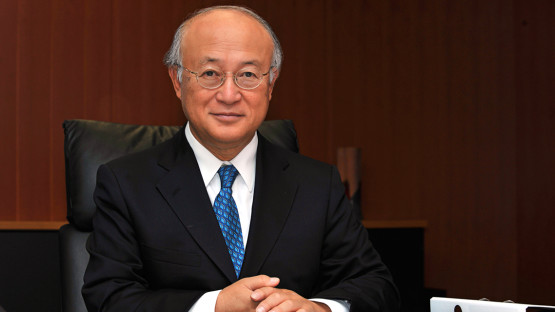(As prepared for delivery)
Good morning, Ladies and Gentlemen,
I am very pleased to welcome you to this 14th IAEA International Symposium on Isotope Hydrology.
The IAEA is best known for its work to help prevent the proliferation of nuclear weapons. But our work to make nuclear science and technology available for peaceful purposes is just as important.
For example, we help countries to use nuclear technology to generate electricity, improve human and animal health and increase food production.
And we help them to manage their water resources more effectively through techniques such as isotope hydrology, which is the subject of this important Symposium.
There is virtually no area of human activity that does not depend on water. It is vital for human health, for agriculture, for industrial production, and for technological development.
For over half a century, the IAEA has been deploying its unique expertise in using nuclear techniques to understand and manage water. In more than 90 countries, our experts work with national counterparts to find, manage and conserve supplies of fresh water.
In Africa, for example, we assisted the four countries that share the Nubian Aquifer – Chad, Egypt, Libya and Sudan – in developing a common understanding of water availability in the aquifer and in cooperating in using the water sustainably.
In Latin America, the Guarani Aquifer is of great importance to the economic development of Argentina, Brazil, Paraguay and Uruguay. We are helping these countries to use the latest isotope techniques to manage the aquifer.
In Asia and the Pacific, water insecurity is a major issue. Many people do not have access to clean drinking water. The effective management of water and environmental resources is central to sustainable development in the region.
Ladies and Gentlemen,
Global demand for water is increasing steadily as the world population grows. More and more water is required for industry and for energy production.
At the same time, climate-induced changes in rainfall, and a decline in the amount of water that we can use from rivers and lakes, are increasing our dependence on groundwater resources in aquifers.
That makes it all the more important that those resources are managed effectively. The need for scientifically rigorous evidence to support policy planning and the allocation of water resources has never been greater.
Nuclear science – and the techniques of isotope hydrology, in particular – have a key role to play in developing the scientific evidence that Member States need in order to manage their water resources and to respond to the effects of climate change.
The theme of this Symposium – "revisiting foundations and exploring frontiers" in isotope hydrology – is timely as the world is presently evaluating the Millennium Development Goals and formulating new targets for sustainable development, including for water. I believe that nuclear science and technology have much to contribute to the achievement of development goals.
The IAEA has been a key part of the global scientific community in developing the science of isotope hydrology. The first IAEA symposium in 1963 was attended by representatives from 14 countries. Today, 84 Member States are represented. This is welcome recognition of the importance of our work in the past five decades.
The IAEA is committed to helping to generate detailed, quantifiable knowledge of the state of the world's water supplies and to improving our understanding of the impact of climate change on our water resources.
Research and development, training and capacity building and technical cooperation are the key elements of the assistance which we provide to our Member States.
We must all work together to ensure that the science behind water management continues to progress so we meet the challenge of protecting this vital resource.
I wish you every success with the Symposium and I look forward to learning about the outcome.
Thank you.


